|
Angels in America
Maybe being one of the most powerful cinematic achievements in recent film history should give anyone reason to watch
the epic mini-series Angels in America. It is an event in itself, which conveys powerful messages set in oddly ironic mind
trips made to entrance the viewer in Mike Nichols sheer perfection. The characters
that Mike Nichols has created are stirringly deep and emotionally satisfying. He
brings depth and warmth to these people making them feel real and interesting. It
doesn’t hurt that he has some of the best talents in the business. That’s
what makes this movie so enthralling and unbelievably poetic. We get Al Pacino,
Meryl Streep, Emma Thompson, Justin Kirk, Mary-Louise Parker and Jeffery Wright giving some of the most committed performances
ever seen on television.
The series is based on Tony Kushner’s
play about Aids in the Reagan years and how the spread shaped and sculpted the views of homosexuals in the mid 1980’s. There are lofty subjects being dealt with in this movie, but the most important is
how we as humans relate to one another and how much we understand about each other.
No character in this movie is held down with broad minded caricatures or overly wrought noble presences. The movie does suffer from long winded theatrical self-important monologues, but even those don’t
get lost in the films message. There is a lot to take in with this movie, from
the massive scope that it undertakes to the over whelming self righteousness of the material.
It feels like a constant head trip beyond normal comprehension, as it swirls around ideas of life contemplating higher
moral ideals. The Aids epidemic is the heart of everything that is discussed
and the pain and realization that this plague brought upon the world to hurt so many people.
As the millennia approaches in this film, we get sense of danger on an apocalyptic scale that feverishly completely
falls apart in the last two hours.
Bringing a play to film is always
a hard design to achieve, but Mike has done a great job here giving a very concrete world in which the characters discuss
their bombastic ideas of life and politics. The production design is as good
as in any film and believably real. The movie is lit nicely and given a light glow on the transfer with theatrical lighting
never having looked more splendid. New
York is given the real world film treatment by cinema photographer Stephen Goldblatt. Richard Edlund is the only false note in the production team, having limited budget to pull off larger
than life visual effects. They work for a moment, but then the end result feels
cheep and laden. Mike does an effective job giving the material a powerful presence
on screen demanding to be viewed and contemplated. This is a truly astonishing
work that never quite gets what it wants. It tries to achieve a new level of
creative originality, but sadly it never reaches that pinnacle of success. The
movie is grand and splendid, but not one that will be always be burned into our psyche.
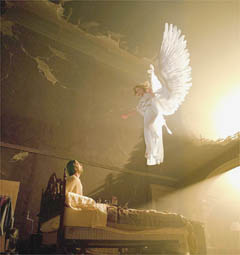
The films main character is played
by Justin Kirk, a young white waspy homosexual male who finds out that he has Aids.
He has lived with his lover Louis Ironson for the last four years and both are pseudo intellectuals always deconstructing
some sort of philosophical idea. Justin plays Prior Walter, who here completely
shines and gives the most riveting performance this year. He is completely engaging
as Prior, giving him a very likable persona and also the presence of a film legend.
Prior is afraid of what the world has become and he is afraid to be alone, something that Louis doesn’t help
with at all. He hides his fear behind satirical wit and an ostentatious likeability. Justin plays the scenes where he is by himself the best, strangely enough they have
the more powerful resonance of all his scenes with the other actors. His lover
is played by Ben Shenkman, his character is slightly too neurotic to be likable and even more annoying when he goes on his
political tirades devolved of anything real or interesting. Ben does loathing
Jewish gay man the best way he can, but a times its just to much to take. He
feels like Woody Allen on steroids and even worse makes complete 180 degree turns in character transitions, with no explanation. Ben’s Louis could have used some more grounding and a lot less depressing rambling
monologues. Louis does the unthinkable to Justin and leaves him when he needs
someone the most. Louis is just incapable of handling his lover going through
Aids and doesn’t stick around long enough to have possibly dealt with it. The
first thing Louis does is run to central park to get a night quickie from some
village person cast off- (amusingly played by Justin with a beard and tight leather duds).
His whole Jewish manifested ego trip is nothing but laughable, because he hates himself so much for having left a person
in a time of need.
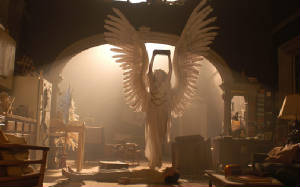
Louis later becomes involved with
a young closeted Mormon Republican lawyer clerk played by Patrick Wilson. Patrick
plays Joe Pitt, a strongly morale young man who is married to a schizophrenic velum-popping wife with heart wrenching depression. The actor conveys such a strong and powerful screen presence giving a desperate vulnerability
that makes him incredibly human. His flawed performance is grand and reaching
as the characters sexual awakening gives way to an unpretentious performance. It
is simply the most underrated performance in the movie. His wife is played with
sublime artistry by Mary-Louise Parker, giving possibly the best performances of her career.
She plays Harper Pitt with an incredible amount of child like vulnerability and keen intuitiveness. Her dreams spill into the imaginary worlds in her head are literally spell binding in there raw need to
feel real. Mary is the only actor able to pull of all the complicated and sometimes
perplexing dialogue without seeming ridicules. Tony Kushner’s play sometimes
becomes to mumbled for its own good loosing the characters in too many monologues, it would have been a good idea for Mike
to have trimmed down the material for screen. Mary comes off being so aloof and
sweet that her magical exploits into mental illness are heart-warningly refreshing.
Mary is visited by a constant travel agent named Mr. Lies (Jeffrey Wright) who gives her visions some sense. Mary’s Harper falls off the deep end when she realizes that her hubby Joe is gay. Her love for him is almost like a sacrifice of sorts and soon she becomes a very unstable girl living in
dreary, but bubbly illusions of life. Harper gets caught by the police for burning
a tree, which in her mind plays out in a very humorous sequence. When Joe tells
Harper of his homosexuality, which she new all along the scene is incredibly touching and destructive. Joe becomes strained from his wife and begins searching the park for prowlers, that not surprisingly brings
him to Louis. On a drunk night Joe calls his mother, Hannah Pitt.
To understand why Meryl Streep is
a screen legend you have to watch her performance in this movie. She plays Hannah
Pitt with such strength and poignancy that she transcends all of the possible clichés her character could have brought. The stern Mormon mother from New Jersey could have easily become a big stereotype,
but in Meryl’s hands she is an unbelievably powerful presence. Meryl also
plays a male Jewish Rabbi in the first part of the movie, which is perfect. She
also has a more solid role as Ethel Rosenberg and gives each performance something different and magnificent. But it is her mother Pitt that delivers the most distinct voice in the film. Prior Walter wants to confront the man that his ex is now seeing and he follows Joe to the Mormon center
in Manhattan. He
instead runs into Joe’s mother and their bonding takes place, creating a central relationship that is different and
mesmerizing in its own right. Prior needs someone to take care of him and Hannah
needs to understand why her son is gay- bring the characters full circle. As
Hannah help build a relationship with Prior, earlier he had been having lively visions far more removed from reality that
Harpers. Prior’s visions are witty and stylized in many different un-worldly
settings. He is never to perplexed by these, but the dreams have a way of pushing
themselves on to him. They frighten him, but nothing more than the Angel who
tells him that she is soon to arrive. Her booming voice fills these dream sequences
feeling odd and overly pretentious. Joe and Louis become involve in a semi-relationship
that sends Louis (Mr. afraid of commitment) running. Their scenes are very sexually
strong and push the envelope of any T.V. movie so far. When things get ugly later
on, the brutal beating that Joe (the sensitive Mormon) gives Louis is profound and extremely hard to watch. The emotion the resonates is compelling and sad, because you never truly feel okay about watching Louis
get hurt, even though he deserves it.
 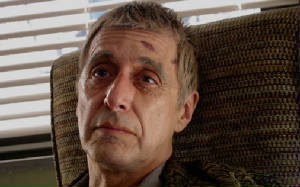
Joe (Patrick Wilson) is offered a
real intriguing job by Roy Cohn to go to Washington and play with the big lawyers. Roy Cohn is played by Al Pacino with iconic presence and a superb evil.
Al Pacino is a film great amongst actors and greatly admired; that’s ever more apparent here. Al gives Roy that distinct hatred and evil
that the man clearly was (Roy Cohn a real world character taken by Tony). He
has this fiery presence on screen that are profound and disturbingly real. Al
has always been a true bombastic actor and it is clearly seen with Roy. He makes him evil and strong- with that great Pacino flair. Roy Cohn finds that he has Aids and hating who he is and what homosexuals represent he refuses to acknowledge
this. He is quick witted with a sarcastic tone that lends him to be a larger
than life person. His doctor tells him that he has aids and that it will be important
for him to undergo treatment. Roy
wont hear this and quickly disputes that he does not have Aids, but Liver Cancer. He
says in a rollicking monologue that he is not a gay man, but a heterosexual man who sleeps with men, because as a society
gay men are by law weak, something that Roy Cohn is not. It’s absolutely
riveting watching Al play this character and as he slowly dies some sort of compassion can be felt, though not one you feel
for long. Roy
is visited by a women that he helped send to the death chair and as in his own words would have gladly pulled the switch. The ghost that stalks Roy
is Ethel Rosenberg (another real world character) who is again played with perfection by Meryl Streep. Her multiple character arcs are strong, but Ethel isn’t much in the way of a character. Ethel just torments Roy and looks at him
the looks of enjoyment as she watches him suffer a long painful death. Roy’s death is extraordinary in the fact that is pushes so much
hatred from the character. The doctor in charge of Roy is the ever excellent James Cromwell, here having a small part but being very effective.
Roy’s
nurse is played by Jeffrey Wright in a stereotypical gay man part. Jeffrey plays
Belize a man who has watched Aids kill
and destroy most of the homosexual community- his acting is sublime to say the least.
He jumps off the page and is extraordinary in every scene he’s in. There
is something to be said about a Jeffrey’s performance as being the every gay man- he is what you would expect a gay
man to act in Hollywood.
It does come off being too forced, but Jeffery is able to strike the right balance of a good character and a complete
stereotype. Jeffery also plays Mr. Lies the magical travel agent that accompanies
Harper on her various journeys down the rabbit hole. Jeffery is the only friend
that Prior really has left and the only one that stays with him. When Louis returns
for forgiveness he is given exactly what he deserves from Prior- tough love with little remorse. As the bonds in the film get stronger especially that of Prior and Hannah- the movie becomes a great meaning
of life, which like all movies should involve a visit from an Angel.
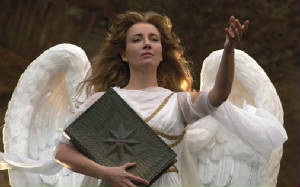
The luminous Angel is played by Emma
Thompson in a bizarre and completely enthralling role. The Angel comes to Prior
in remarkable dreams that she announces he is a profit. These scenes are a spectacle
as the Angel floats and destroys things around her giving a booming loudness to her powerful Shakespearean quips. She is amusing and beautiful and the end of Part 1 is a shocking revelation. The Angel doesn’t disappoint and neither does Emma Thompson, who gives the Angel a powerful presence
(which I’m sure the lighting helped) and makes her a sort of metaphor. She
makes Prior into a prophet who needs to know of the world and everything about it. She
tells him that god left man behind and that the plague spreading over the world is also destroying the Angels. Emma is riveting and her scenes are pure style. The Angel
herself is remarkable as she flies and makes her presence perfectly clear. The Angel’s arrival is marked by Prior getting very excited (hint) and knowing the
joys of human orgasms. These sequences are odd and strangely beyond belief, especially
what the Angel gives Prior. When the Angel returns she comes in a state of grief
ready to battle the prophet until she blesses him. This scene is truly an awkward
part of the movie, it never makes sense and comes off being a little to jarring. The
Angel wrestles with Prior and this includes the breaking of walls and fire and all sorts of odd antics. Prior doesn’t want to be a prophet and fights the luminous angel to be left alone. After he defeats her, he is quickly lead to Heaven where things feel even more out of place. Heaven isn’t that great or interesting- it sort of feels like a perfume add with models wearing wings. It never sets the right tone, but revelations aside he does get blessed.
All the stories in this movie intertwine
creating a tour de force masterpiece unlike anything I can remember seeing. It
is beautiful and heart breaking and real all at once. It never seizes to amaze
me and the quality of the performances makes this movie worth remembering. The
production is well executed and Tony Kushner’s story is worth all the praise it can get.
There is so much going on in this film that the characters sometimes don’t make sense or feel out of place, but
as a whole the movie is pure movie making. It is an iconic piece of work that
is more poignant and magnificent than anything you will find on Television. This
a movie that deserves to be seen by everyone purely on its artistic merit and unbelievably grand scale. Is the movie to much? Yes, it tries to capture to many meanings
with large scope, but misses just a little to much. Is it a cinematic achievement? Absolutely.
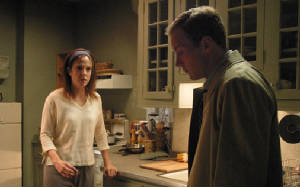
HBO Films presents
An
Avenue Pictures Production
A Mike Nichols Film
Casting by Juliet Taylor and Ellen Lewis
Visual Effects Supervisor
Richard Edlund, ASC
Music Supervisor Evyen J Klean
Music by Thomas Newman
Costume Designer Ann Roth
Editor John
Bloom
Production Designer Stuart Wurtzel
Director of Photography Stephen Goldblatt, ASC, B.S.C.
Co-Executive Producer
Michael Haley
Producer Celia Costas
Executive Producers Cary Brokaw Mike Nichols
Screenplay by Tony Kushner
Based
on his play
Directed by Mike Nichols
|

